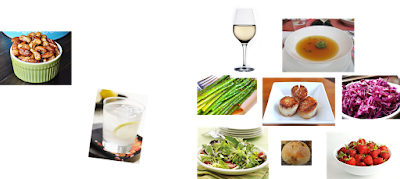Hey Everyone, I just completed a course for my CEU's entitled "Understanding Addictions: Food, Drug, & Alcohol". Needless to say the part that covered food was quite interesting! With that in mind, I'd like to share advice that was given for treating overeating and food addiction.
1. Learn what triggers overeating episodes. In behavior therapy, this is known as identifying the "A-B-C's"; antecedents, behavior, and consequences. What happens just before the overeating begins? How much of what foods are consumes in what way in response? What happens afterward and how do I feel? Identifying these factors will help set the stage for doing something about it. If you don't know what's wrong, you can't fix it.
2. Make a list of things that you like to do that you can do when you get the urge to eat and you are not hungry. Carry this list with you. When you are overwhelmed by food cravings, you can put off that desire by doing another enjoyable activity. These can be pleasurable things like catching a movie, playing golf, or activities like taking a walk, calling a friend, playing cards, cleaning your room, doing laundry, and even taking a nap.
3. When you get the urge to eat when you are not hungry, find a comfort food that's healthy instead of junk food laden with added sugar, fat, and salt.
4. Try smaller portions of the craved comfort foods. Leaving them behind completely is often very difficult and you can begin to "shape" a reduction in consumption by gradually lowering portion sizes. The key is moderation, not complete elimination, which can product strong cravings that are even harder to resist. If you have a large bag of chips, divide it into smaller bags or containers and eat the smaller portion.
5. Research shows that the emotional memory of the pleasurable nature of comfort foods peaks after about four bites. You can try eating four bites of the food, especially when it's sweet and fatty desserts like cheesecake. You will recall this memory as being just as rewarding and satisfying as eating the whole dessert. Therefore, you will get equal pleasure at a lower caloric cost.
6. It is important to remember that overeating is being done when we are sad, anxious, bored, or tired. Learning to deal with these emotional states in a more effective manner is the biggest key to decreasing and even eliminating emotional overeating. This often requires the help of a trained therapist and can consist of such techniques as meditation, cognitive-behavioral therapy, behavior therapy, motivational interviewing, supportive and family counseling, and nutritional counseling.
Try applying these points if you are having difficulty with controlling your food intake and see how you feel!
Thursday, February 23, 2017
Wednesday, February 22, 2017
More for Less - Cocktails or Dinner
More for Less - Cocktails or Dinner
Drink and Nuts
•2 ½ fluid ounces of vodka = 300 calories
•½ cup mixed nuts = 440 calories
Total = 740 calories
Versus
Dinner
•1 cup consommé = 20 calories
•5 oz. scallops = 150 calories
•Asparagus = 20 calories
•Red cabbage = 50 calories
•Tossed salad = 20 calories
•Semolina roll = 80 calories
•Berries = 60 calories
•3 oz. wine = 90 calories
Total = 490 calories
Subscribe to:
Comments (Atom)

